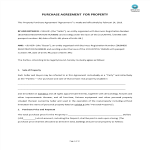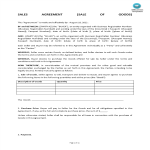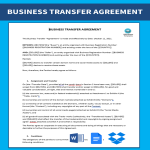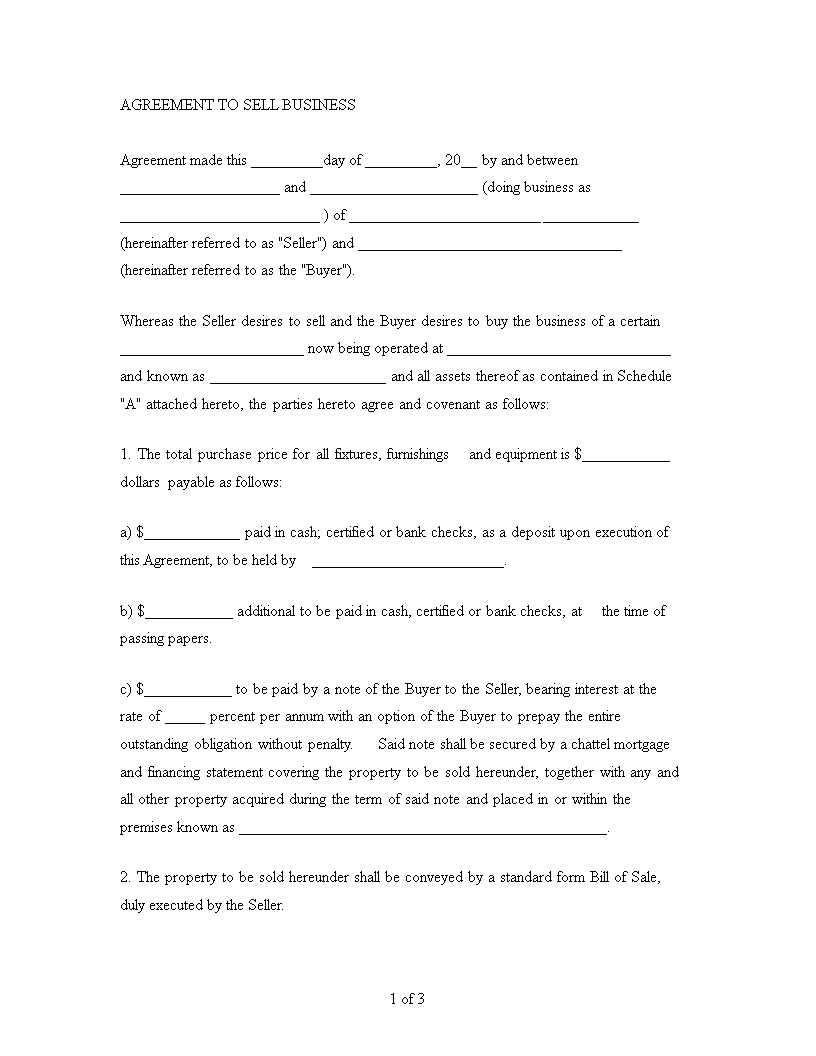Business Sale
Save, fill-In The Blanks, Print, Done!

Download Business Sale
Microsoft Word (.doc)Or select the format you want and we convert it for you for free:
- This Document Has Been Certified by a Professional
- 100% customizable
- This is a digital download (28.5 kB)
- Language: English
- We recommend downloading this file onto your computer.
Searching for templates in the Business Sale Agreement? What are the key elements that are typically found in a Business Sale Agreement? Templates for business sale agreements are available here, they provide a comprehensive overview of the agreement, including terms and conditions, payment schedules, and other important information. Download this sample template now!
A Business Sale Agreement, also known as a Business Purchase Agreement or Sale of Business Agreement, is a legally binding contract that outlines the terms and conditions for the sale and transfer of ownership of an existing business from a seller to a buyer. This agreement is a crucial document in the process of buying or selling a business, as it serves to protect the interests of both parties and provide a clear record of the transaction.
Here are the key elements typically included in a Business Sale Agreement:
- Parties: Identify the parties involved, including the seller (the current owner of the business) and the buyer (the individual or entity purchasing the business).
- Business Description: Provide a detailed description of the business being sold, including its legal name, trade name, location, industry, and any relevant licenses or permits.
- Assets and Liabilities: Specify what is included in the sale, such as tangible assets (e.g., equipment, inventory, real estate), intangible assets (e.g., trademarks, customer lists, intellectual property), and any assumed or excluded liabilities.
- Purchase Price: State the total purchase price for the business, along with the breakdown of how it will be paid (e.g., lump sum, installment payments, financing arrangements). It may also include details about the allocation of the purchase price among different assets.
- Payment Terms: Outline the payment schedule, including any escrow arrangements, earn-out provisions, or contingencies related to the purchase price.
- Due Diligence: Specify any due diligence requirements, including access to financial records, contracts, and other relevant documents, to be conducted by the buyer before the sale is finalized.
- Representations and Warranties: Detail the representations and warranties made by the seller regarding the business's condition, financial statements, legal compliance, and other important aspects. This section provides assurances to the buyer and may outline remedies for breaches of these representations.
- Covenants and Conditions: Include any covenants or conditions that both parties must fulfill before the sale is completed. This may involve actions such as obtaining necessary approvals, permits, or financing.
- Closing Date: Specify the date on which the sale will be finalized, and ownership and possession of the business will be transferred to the buyer.
- Non-Compete and Confidentiality: Address any non-compete agreements, confidentiality clauses, or restrictions on the seller's future involvement in a competing business.
- Indemnification: Define the responsibilities and procedures for indemnification, outlining how disputes or claims related to the business after the sale will be handled.
- Governing Law and Jurisdiction: Specify the jurisdiction whose laws will govern the agreement and any legal disputes that may arise.
- Signatures: Both the seller and the buyer, as well as any witnesses, should sign and date the agreement to indicate their acceptance and commitment to the terms.
A well-drafted Business Sale Agreement is essential to protect both parties' interests and ensure a smooth and legally compliant transfer of ownership. It is advisable for both the buyer and the seller to seek legal counsel when negotiating and drafting this agreement to address their specific needs and comply with applicable laws and regulations.
Download this Business Sale Agreement template and use it as a guide in creating your own agreement template!
DISCLAIMER
Nothing on this site shall be considered legal advice and no attorney-client relationship is established.
Leave a Reply. If you have any questions or remarks, feel free to post them below.
Related templates
Latest templates
Latest topics
- GDPR Compliance Templates
What do you need to become GDPR compliant? Are you looking for useful GDPR document templates to make you compliant? All these compliance documents will be available to download instantly... - Google Docs Templates
How to create documents in Google Docs? We provide Google Docs compatible template and these are the reasons why it's useful to work with Google Docs... - IT Security Standards Kit
What are IT Security Standards? Check out our collection of this newly updated IT Security Kit Standard templates, including policies, controls, processes, checklists, procedures and other documents. - Letter Format
How to format a letter? Here is a brief overview of common letter formats and templates in USA and UK and get inspirited immediately! - Google Sheets Templates
How to work with Google Sheets templates? Where to download useful Google Sheets templates? Check out our samples here.
cheese




